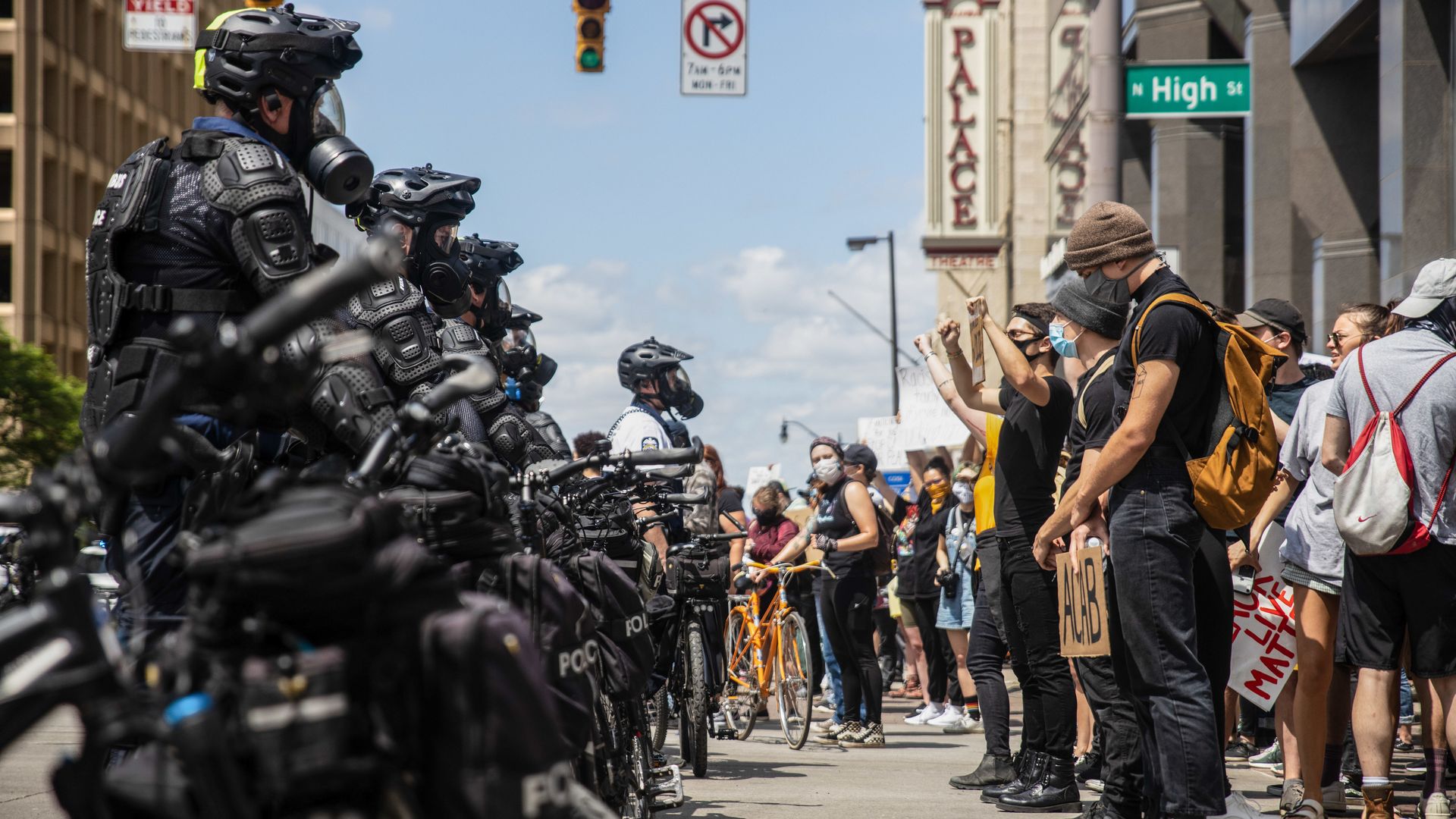Apologies from Columbus police analyzed
Add Axios as your preferred source to
see more of our stories on Google.

Protesters and Columbus police officers during the 2020 summer protests after George Floyd's murder in Minneapolis. Photo: Megan Jelinger/SOPA Images/LightRocket via Getty Images
A year after Columbus police officers officers showered people downtown with wooden bullets and tear gas during the protests of 2020, a deputy chief apologized at a public forum.
- But an apology means nothing when it's eclipsed by continued violence and a lack of accountability, activists tell Axios.
Why it matters: Cities remain reluctant to apologize or admit wrongdoing for many recent cases of alleged police misconduct, especially those under litigation, an Axios review found.
Despite the Columbus deputy's atonement, public trust in the Columbus Division of Police remains tepid — especially as the force has made headlines for high-profile shootings of Black people, for which there have been no apologies.
The latest: Last month, Ricky Anderson shot and killed 20-year-old Donovan Lewis in his bed while serving an arrest warrant in the middle of the night. Anderson is on paid leave pending a state investigation.
- A trial for Adam Coy, who fatally shot 47-year-old Andre Hill in 2020, begins next week.
What they're saying: "Saying you're sorry is something you do when you're put into detention in fourth grade … these people are dead," Aramis Sundiata, executive director of the People's Justice Project, tells Axios. He called apologies "a tactic to pacify the people."
Catch up quick: In December 2021, the city agreed to pay a $5.75 million settlement to 32 plaintiffs who, led by a People's Justice Project organizer, sued over the 2020 protest response.
- The city also agreed to permanently ban officers from using "tear gas, pepper spray, flash-bang grenades, rubber bullets, wooden pellets, batons, body slams, pushing or pulling or 'kettling'" against nonviolent protesters.
- Three officers faced charges for their behavior but all were found not guilty or had their charges dismissed. A special prosecutor told WOSU she lacked resources to try the cases and was stonewalled by uncooperative officers, allegations the police union's president disputed.
Yes, and: Last year, the U.S. Department of Justice accepted an invitation from the city to review the police divsion's practices for potential racial biases, which is still ongoing.
The other side: Columbus police spokesperson Sgt. Joe Albert tells Axios that the division has made "substantial and significant changes" since 2020 and subsequent demonstrations haven't escalated to violence.
- That includes a "complete overhaul of how officers respond to civil unrest, training on protest response by the foremost experts in the world and better ways to identify officers involved in such responses," he says.
Reality check: Many changes weren't optional, though, notes Dion Mensah, an organizer with the Black Queer & Intersectional Collective.
- This summer, City Council mandated officers wear badges, even in riot gear or "alternate uniforms."
- And in November 2020, city voters agreed to form a civilian review board and an inspector general's office — though critics note that such boards, including in Columbus, typically have little power beyond making recommendations.
Of note: Albert declined to comment on whether an apology makes a practical difference in the scope of police reform.
The bottom line: Judson Jeffries, a professor of African American and African Studies at Ohio State University who's written about police and community relations, says change doesn't happen from symbolic gestures, but from cultural and systemic overhauls.
- Jeffries used a fender-bender analogy to describe the situation.
- "If the person gets out and apologizes for it, and the person is sincere … it's a step in the right direction. But at the end of the day, the car still needs repairing," he tells Axios.
